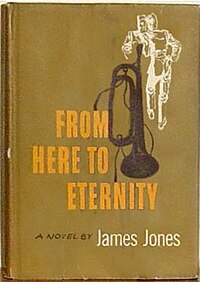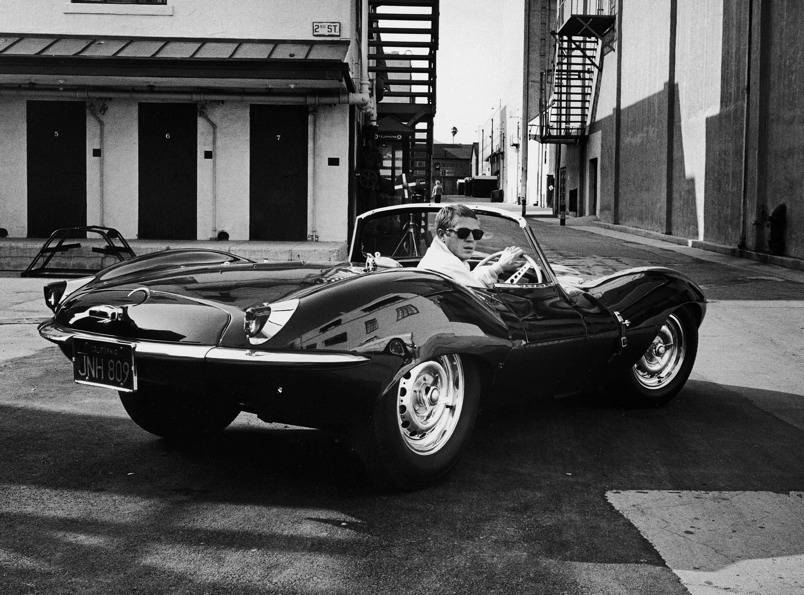It’s no coincidence that on the last day of August we’ve only just finished our summer reading of From Here to Eternity by James Jones. The text of this seminal 1951 military novel clocks in at a whopping 896 pages. And yet it rarely fails to captivate.

Set in and around the Schofield Barracks near Diamond Head in Honolulu, Hawaii in the months leading up to the Japanese attack on Pearl Harbor, From Here to Eternity tracks the lives of several soldiers and their women in this last peaceful period before WWII. Principal among them are Private Robert E. Lee Pruitt and First (“Top”) Sargent Milton Warden. Pruitt is a poor Kentucky boy who enlisted in the Army after escaping the mining town that consumed his parents and bumming around during the Depression. His aim is to be a “30-year-man”, a career soldier, because he loves the ideal of the Army, the camaraderie of the men and the art of soldiering. It is really the only true home he’s ever known.
He is a virtuoso on the bugle and a champion contender as a welterweight boxer, the latter being a particular obsession as a means to career advancement of his commanding officer in G Company, Captain Dana “Dynamite” Holmes. But due to his own sense of honor, Pruitt denies to engage in either of the specialties that might make his life in the Army easier and more privileged. In the case of the bugle, it is implied by Jones that Pruitt has resisted homosexual advances from his former Bugle Corps commander and hence been passed over as First Bugler for another, more willing “pretty boy.” This directly leads to his request for transfer into Dynamite Holmes’ G Company as a regular soldier, abandoning his cushy life in the Bugle Corps and his corporal’s stripes. But when Holmes tries to recruit Pruitt into his regimental boxing division, which itself carries a new set of privileges and easier duty, Pruitt also refuses this opportunity because he has previously blinded a sparring partner. This leads Holmes to order his men to give Pruitt “The Treatment”, a series of arduous duties assigned to malcontents such as extra KP, cancelled leave and repeated forced marches with full pack up the mountainous Hawaiian terrain, all in an effort to bend Pruitt to his will and force him to fight on the boxing team.
So Pruitt’s own concept of honor puts him in opposition with the very institution that he loves and reveres, as the Army’s implacable ways and hidden politics grind away at him physically and mentally. It is another great example in fiction of the hero unable to take the easier, more comfortable path because of his inner code of right and wrong and his stubborn independence. To surrender and choose the safe route would leave Pruitt unable to live with himself as a man by forfeiting his most important possession, his honor. No matter how self-punishing his choices in the face of institutional and peer pressure to conform and abandon his individuality, there is no question in Pruitt’s mind about relenting and reversing the decisions he has made as an independent and free man. And so he flirts with his own destruction at the hands of the institution he most loves rather than give up his free will.
In the case of First Sargent Milt Warden, his obsession is the smooth running of G Company, his control of its every aspect of staffing, equipment and scheduling. He is the true power behind the throne, not the supercilious social climbing Dana “Dynamite” Holmes. And his lack of respect for Holmes as a true soldier, his hatred of officers in general, leads him to make a rash and uncharacteristically risky decision, but one that he commits to unreservedly: to seduce Captain Holmes’ beautiful but icy wife, Karen. Despite the fact that such an impropriety would destroy his career, Warden pursues and seduces Karen Holmes (or is it she who seduces him?) and they begin a tumultuous affair over the months leading up to Pearl Harbor. He learns about her troubled marriage as they fall in love. And she tries to get him to enlist in the expanded officers’ candidate training for Non-Coms so that when she divorces Holmes, he will be a fit husband for her socially. But what they really want is at cross purposes: her, escape from a loveless marriage; him, to possess such a beautiful officer’s wife while remaining true to his non-com code, yet still remain in control of his company as Top Sargent as it readies for war. And so these two strong-willed personalities battle for a sort of supremacy, neither one able to stay in control of the other for long in their complicated relationship.
And there are many other deeply involved stories within From Here to Eternity: from Pruitt and Warden’s own complicated but ultimately respectful, humorous and almost brotherly relationship as self-described Army lifers; to Pruitt’s love affair with the baby-faced but calculating whore Lorene at the New Congress Hotel bordello in downtown Honolulu; to the self-desctructive misfit from Brooklyn, Sal Maggio, who outdoes even Pruitt in obstinate disobedience to the Army, becoming more fearsome and wild in his rebellion even as he does hard time in the stockade. In short, this is an epic book with a multitude of fully fleshed male and female characters with their own motivations for their behavior, their own light and dark sides. The men are tough and brusque, yet vulnerable to their longings and injuries to their pride. The women are also tough, sometimes less sentimental than the men it seems, in a pre-feminist era where they have to negotiate the male-dominated society of the Army and the United States in general with their own priorities, methods and sense of steely determination. Jones is far ahead of his time in laying bare the imperatives of human sexuality and need, both straight and gay, and of the beauty and cruelty inherent in Army life. And this novel is not so much one of war (for that, see his nonpareil The Thin Red Line) but of the time before the War, of America emerging from Depression and hardscrabble lives led by desperate people with undeniably harsh backgrounds seeking a refuge and purpose in the military. It documents an America shaken by communist labor movements like the Wobblies, when democracy itself seemed like an unresolved question in the face of such economic collapse and rising fascism abroad. And running strongly throughout the novel is a pre-War snapshot of Hawaii itself, its unique status as part of and distinct from greater America, its exoticism and seediness, the ultimate playground for a solider on leave or the well to do, and the ultimate training ground for the Army of the Pacific that would face so many brutal trials in WWII. From Here to Eternity depicts a bygone and pivotal era of history and does it brilliantly by portraying a hardened, cynical breed of Americans still ultimately somehow innocent on the eve of history’s greatest cataclysm.
In short, From Here to Eternity is James Jones’ masterpiece and one of the towering achievements of 20th Century American literature, war-related or otherwise. And like all great books, it will stay with you and you will be the better person for reading it.
You can buy the hard copy of FHTE or download the Kindle version at Amazon.com. Go for the unabridged version, as Jones’ frank and salty writing style was often edited in older texts to placate the morality police.
I’ll write another entry on the outstanding classic 1953 movie version of FHTE at a later date.
